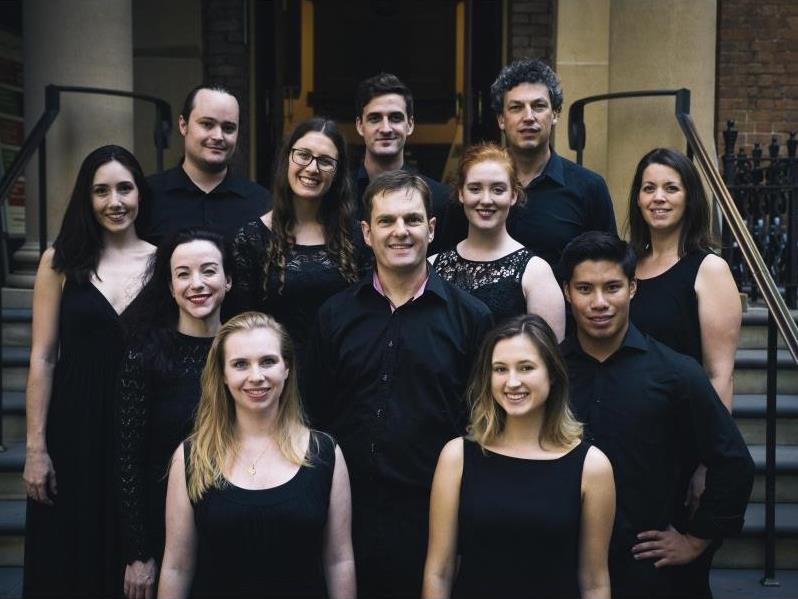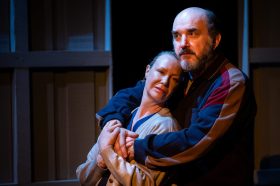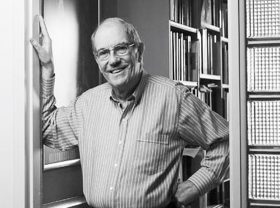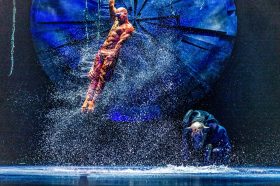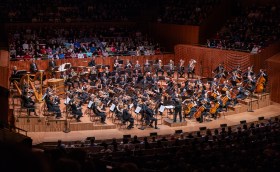The Choir of St James’. Photo: Nick Gilbert.
St James’ Church, King Street, Sydney embraces a music program that is second to none in the major churches and cathedrals around Australia. It seems to go from strength to strength under the enlightened leadership of its director of music, Warren Trevelyan-Jones. With the strong support of its clergy and parish, there is currently a $2 million fundraising campaign to replace the main organ and thereafter hopefully to purchase other fine instruments.
The Choir of St James’ is to my mind one of Australia’s best vocal consorts attracting excellent musicians back from rich careers in the UK and Europe, as well as developing the finest local talent. This is the grand fulfilment of the music mission set out by the Reverend Peter Hughes when he was the rector at St James’ in the 1990s.
The title of this performance, Encounters with Mr Handel, intrigued me. Of course, it has long been the custom for England to claim this great composer, one of the finest Baroque composers of his day, as its own. Yet he was born Georg Friederich Händel, settling in London at age 27 fully formed and musically fledged in both Germany and Italy. The major academic publishers of his music, such as Bärenreiter in Germany, still publish under his birth name today.
Herr Händel, always an astute businessman, doubtless carried a strong German accent throughout his life. He made his mark in London principally with a swag of operas in Italian, social custom at the time considering Italian more suitable than the vernacular. As he made acquaintances and friends, he began to reticently compose English sacred choral and instrumental music, appealing strongly to the contemporary ideals of the Age of Enlightenment. Of his vocal compositions, the highly popular pastoral opera Acis and Galatea (1718) with text by John Gay and the blockbuster oratorio Messiah (1741), also set in English with a scriptural text compiled by Charles Jennings, are two of his most popular and enduring compositions. Only some of his operas such as Giulio Cesare in Egitto, written in 1724, have remained in repertoire over the past three hundred years, though other important works have been attracting the attention of major opera houses around the globe.
The centrepiece work performed on this program was a rather peculiar pastoral ode, L’Allegro, il Penseroso ed il Moderato (1739). Set in English with text developed from Milton by Jennens and Harris, this is a work without plot in three parts, a dialogue of sorts between L’Allegro ‘the cheerful’ (expressing exultation), il Penseroso ‘the thoughtful’ (accepting melancholy) and Moderato ‘moderation’. The work ultimately presents a triumphant if somewhat wincing evocation of temperance and self-control, the concluding text pronouncing ‘grace from order, measure, time, place and goodly structure.’
And so to the performance: on this occasion the vocal ensemble, excellent but for a bland alto section, was joined by a fine quartet of soloists in sopranos Amy Moore and Chloe Lankshear, tenor Richard Butler, and baritone Andrew O’Connor. As well, there was a keen but somewhat ‘green’ orchestra titled BachBand@StJames’.
Trevelyan-Jones, himself a distinguished British tenor, provided us with the excellent tenor soloist Richard Butler, former choral scholar of King’s College, Cambridge. Here was a clear-sky-blue English tenor; expressive, profoundly connected with his text and providing immaculate diction. His performance was faultless. Both sopranos, Amy Moore and Chloe Lankshear were also of the first order, warm and musical, but for a need to concentrate further on clear diction and pure vowels. Andrew O’Connor was as lively and brilliant as ever, with a pleasing command of the upper range of his arias.
The orchestra had a familiar sound (loud, edgy and sometimes ignorant) that to me sounded as if it needed two more rehearsals. But praise is due to sole violist Nicole Forsyth for her expressive ornamentation and to the recorder pair Mikaela Oberg and Alana Blackburn. The distinguished continuo section (Anton Baba, cello; George Wills, theorbo; Anthony Abouhamad playing a Marc Noble harpsichord from 1986; and finally chamber organist, Titus Grenyer struggling with a Roland electronic contraption) was adequate, though unconvincingly connected. Wills’s theorbo was largely inaudible and there was neither ornamentation nor expressive elaboration.
With the ambitious vision of St James’ we can only hope for a suitable portative instrument for Handel’s organ concertos to be played upon. It was very strange to me that St James’ would consider presenting a movement from a Handel organ concerto on such a ridiculously unmusical instrument.
3.5 stars out of 5 ★★★☆
Encounters with Mr Handel
25 May 2019
St James’ Church, King Street, Sydney
Tickets $45-$50
